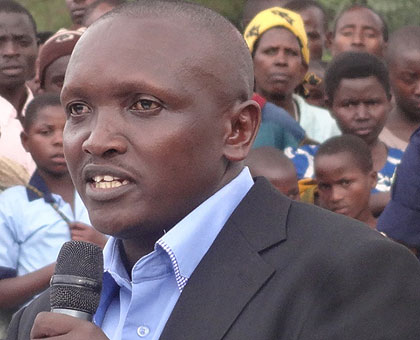TWENTY YEARS AGO, Rwanda descended into Genocide. A hundred days of massive manslaughter leading to the death of over a million individuals in what is regarded as one of the worst and deadliest tragedies in modern days.


TWENTY YEARS AGO, Rwanda descended into Genocide. A hundred days of massive manslaughter leading to the death of over a million individuals in what is regarded as one of the worst and deadliest tragedies in modern days.
Perhaps what most people remember about the 1994 Genocide against the Tutsi are tales of the grim and dreaded betrayal, slaughter of innocent people, stories of neighbours butchering neighbours or of people killing their relatives or betraying them; the tales of the shadow of death as it hovered over the country.
But what remains undisputable is the fact that there are a number of fearless individuals, however, few they may be, who ferociously and heroically stood against the killings, themselves becoming targets of killers.
Many paid the price for their brave acts and were killed alongside those they attempted to protect. Others were lucky to survive and saved many lives.
Born in 1966 in the south-eastern district of Kirehe, near the Rwanda-Tanzania border, Mathieu Fashingabo grew up in a society which had been divided along ethnic lines.
He remembers well how as school children, teachers usually taught them what they called the differences between Hutu and Tutsi.
Fashingabo says some of the differences were even ‘ridiculous and silly’-he remembers his primary school teacher once saying that "Tutsi are often hygienic and smart while Hutu are sometimes unclean.”
"This was seemingly an intention to widen the gap between people,” he says.
When the mass killings broke out in April 1994, Fashingabo who was then an employee of the then Muhazi Commune, felt the need to do something to protect the Tutsi.
Having served as the Assistant Bourgoumestre (assistant mayor) from 1988, he knew something bad was going to happen. Earlier, he says he had witnessed Interahamwe militia being taken for training and recalls how some of the recruits later returned and "used to brag that one day Tutsi will be killed”.
He had also witnessed the arrest, torture and murder of a number of Tutsi on accusations of being sympathisers of the Rwanda Patriotic Army.
Ferrying Tutsis to Tanzania
In the night of April 6, 1994 while he was enjoying his annual leave at his home in Rusumo commune, Fashingabo heard on Radio Rwanda, the public broadcaster, a government statement banning public gatherings.
He says he knew something bad would follow and the next morning he woke up to widespread killings.
"I believe the ban was intended to ease the killings of Tutsi. As they were already known, the Government decided to ban gatherings for militia to be able to target Tutsi in their homes,” Fashingabo argues.
"They might also have intended to quell any possible resistance and make it difficult for Tutsi to access information on what was going on.”
Around April 10, hundreds of Tutsi fleeing killings in the former Rukira and Birenga communes arrived in Muhazi with hopes of crossing to the other side of the border with Tanzania.
Realising that the fleeing Tutsi faced imminent death, Fashingabo decided to help them cross. So he mobilised other members of a local fishing group, for which he was a member, to help ferry the Tutsis through Akagera River to Tanzania.
With a fleet of eight small wooden boats, the fishers turned sailors started transporting the Tutsi to Tanzania in the morning of April 15.
"Each boat carried between six to eight people at once,” he says. "By 5pm, we had helped dozens of individuals to cross the border,” he adds.
Tracked by Interahamwe
But the Interahamwe later learnt that Tutsi were escaping to Tanzania through Migera sub-port where Fashingabo and his colleagues were operating.
While en route back to their homes later that day, Fashingabo and the other sailors met with dozens of militiamen who were sent to kill those attempting to flee to Tanzania.
"Some of them were dressed in banana leaves,” he recalls.
"They told us they cannot allow the Tutsi who murdered their father (former president Juvenal Habyarimana) to flee,” he adds.
But Fashingabo decided to confront the killers. Using his powers as the assistant Bourgoumestre, he instructed the killers to return back and after spending a long time discussing with them, he managed to convince them.
"It was by luck that they accepted my pleas. Maybe they didn’t know yet we were the ones ferrying the Tutsi to the other side of the border,” he says.
The next day the sailors returned and continued to help the Tutsi escape to Tanzania. All in all, they helped more than 1000 Tutsi to cross.
However two days later, on April 18, hundreds of Interahamwe launched an attack on the Migera sub-port and destroyed all the boats. They also killed the Tutsi who remained there, Fashingabo says.
One of the boat operators was also tracked, caught and killed alongside his wife and children in retaliation for supporting Tutsi. Others escaped.
Those unable to escape were then rounded up and killed in places such as Nyarubuye for the following ten days until around April 28 when the Rwanda Patriotic Army took control of the area.
About 51,000 Genocide victims are today buried at Nyarubuye Memorial site.
"This is an experience I do not want to relive anymore,” Fashingabo says.
"As Rwandans, we should endeavour to promote peace and focus on what develops us rather than what divides us,” he adds.


